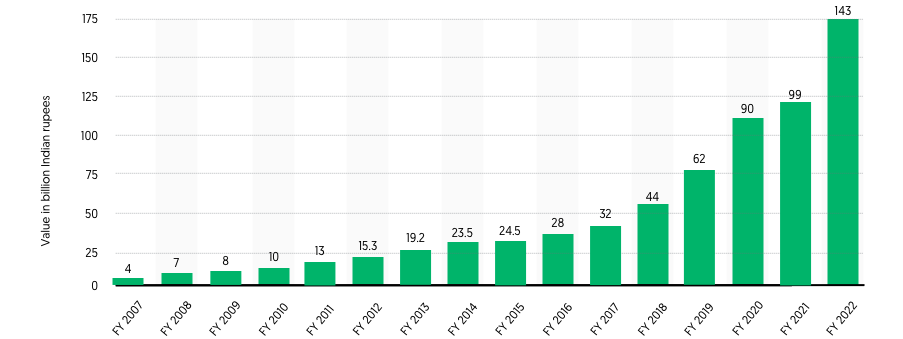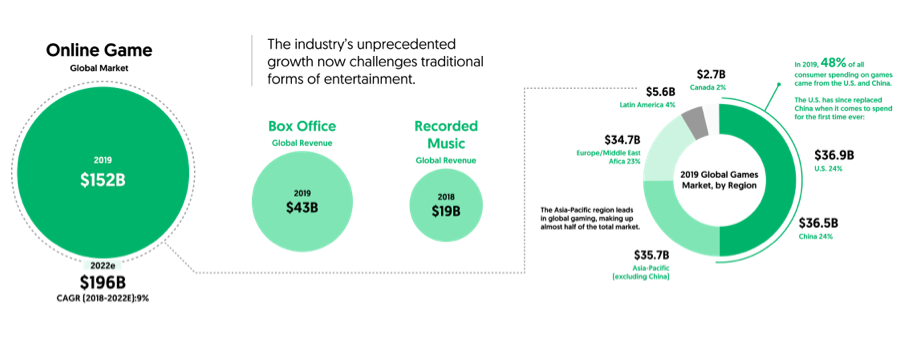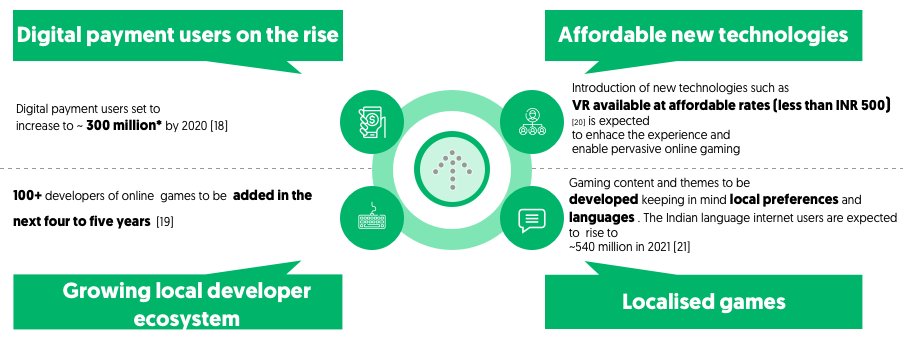The Immense Potential of Online Gaming in India
Online gaming is the world’s favorite form of entertainment and its rising popularity is opening doors on a variety of fronts.
Gaming isn’t a novel concept for a country like India. The affinity for gaming amongst Indians can be traced all the way back to the ’90s, when hand-held gaming consoles and 8-bit games like Mario and Contra were all the rage. Unfortunately, this craze dwindled a little bit at the beginning of the new millennium as the next generation of gaming consoles were met with dismal results in the country due to their expensive rates and overall inaccessibility.
Fast forward to 2021, according to a survey by Deloitte India, the market is predicted to develop at a 40 percent compound annual growth rate (CAGR) from $1.1 billion in 2019 to $2.8 billion in 2022. As per a report by KPMG research, the market value will increase by 113% from $1.83 billion this fiscal year to $3.91 billion in FY2025.
Gaming industry has found a new life in the country due to the pervasiveness of mobile technology. Indian gamers can now satiate their thirst for digital thrills with a slew of games that can be easily downloaded on an Android or iOS device. Online gaming is divided into three categories: real money games, casual games, and e-sports. With gamers in India showing interest in all three categories, India's gaming industry is now the world's fastest rising. So far, the top-performing online games have been rummy and poker. The gaming juggernaut has begun, with the number of online players rising from about 300 million in 2019 to 433 million in FY20-21.
A variety of genres have found a die-hard fan-base in the country, especially the fantasy sports genre. Companies like Dream 11, MPL, HalaPlay, and more, have capitalized on the cricket frenzy consuming the country to create fantasy sports platforms that have arguably become vital backbones of India’s economy. The gaming industry in the country was worth 90 billion INR in the year 2020. This is a colossal leap from where the industry stood just a few years ago.

Suffice to say, the gaming industry has immense potential in the country. They can be a source of endless revenue streams and mounting employment opportunities. However, it is not easy to start an online gaming business in India overnight. There are frustrating challenges to overcome if one wants to succeed in this potentially lucrative industry.
So in this article, we will be looking at the various aspects of the gaming industry that signal its potential in India, and also look at the challenges that can thwart that promise.
Rise of Online Gaming in India
At a time when popular entertainment industries have seen tumbling revenues, it is surprising to see the gaming sector not only exhibit stability but also rapid growth. According to Reuters, the gaming sector has seen its revenues increasing at an annual rate of 10.7%. Gaming is the world’s favorite form of entertainment, after generating more revenue last year than TV, movies, and music. Some of the fastest-growing markets are relatively new ones, such as China, where game sales are increasing at a rate of 14% per year.

Investments from the venture capital companies have increased at a CAGR of 22% between 2014 and the first few months of 2020. There are currently 400 gaming startups in India. With over 500 million smartphone users as of December 2019, mobile gaming has taken centre stage, accounting for 85 percent of the country's online gaming landscape.
If we look at the market worth of the global fantasy gaming industry, then it stands at $19 billion as of 2020. This number is expected to reach $48 billion in the next seven years. It shouldn’t come as a surprise to anyone that a huge piece of this pie came from the Indian gaming sector which registered revenue of 2,470 Cr in the same year. In the last year alone, the Indian market has added a whopping 100 million active gamers. Most of these gamers were smartphone users and indulged in the services of fantasy sports platforms. This is a phenomenal growth, as there were only 2 million active gamers in the country. There are almost 700 million smartphone users in India, and roughly 14% of them are estimated to be active on online gaming platforms like Dream 11, PayTm First Games etc.
Another factor to gauge the huge potential of this sector in India is their significant contribution to the country’s accumulated GST revenues. According to a PwC India report, the industry is expected to contribute a GST revenue in the range of 3000-3500 Cr in the coming years. The current investment figures also shed a positive light on the Industry. Dream sports raised $225 million, whereas $90 million was raised by Mobile Premier League. According to Tracxn, many gaming startups have raised a grand total of $131.1 million last year, the most in the last six years. Among those who have received funding, fantasy sports platform HalaPlay received investments from Milan Ganatra, Dangal Games received $1 million in series A funding last year, Winzo closed its series B funding last year, and fantasy gaming startup Playerzpot, raised $3 million.
Understanding the Indian Gamer User profile
Just like gamers around the world, an average Indian gamer is generally young. According to Google’s own research, almost 83% of gamers are students and working adults, with most of them being younger than 25 years of age. The Indian online gaming industry is mostly male-dominated, with 65% of users being men.
Indian gamers also prefer to engage with games that build social connections. In other words, community-building games are more attractive to Indian gamers than gaming alone. An average Indian gamer will gravitate towards apps that possess an attractive logo, a user-friendly interface, a great background score, and a compelling narrative structure. It is also interesting to note that Indian gamers are mostly frugal. This has to do with the fact that most of them are young and do not earn sufficient revenue. As such, they will usually opt for games that are free to play. They are also less likely to make in-app purchases.
In a recent study, 56% of the gamers did claim that they were ready to pay for a particular feature if it would enhance their gameplay experience.
Genre Preference
Most Indian Gamers like to indulge in games of the following genre
1 - Puzzle
Games that require one to be cerebral and calculative are a favorite among Indian gamers. This includes games that offer pattern recognition, sequence solving, and word competition among many others.
2 - Action
Games with high-octane action are particularly attractive to gamers seeking an enthralling experience. These games require intense hand-eye coordination.
3 - Strategy
These games rely on the decision-making skills of a player and present players with dilemmas that can be solved by devising a strategy.
4 - Sports
These include sports-based simulations largely influenced by real-world games like Cricket and Football. Currently, fantasy sports is a major part of this genre.
5 - Arcade
These are single-player games that possess short levels, ingenious control schemes, and difficulty settings that increase with each passing level.
Growth Factors
The Further Growth of the Indian Online Gaming Sector is expected to be triggered by the following 4 factors.

1 - The Rise of Digital Payment Methods
With payment systems like Google Pay and PayTm becoming pervasive across the country, online payment has become considerably simpler. There is a higher probability of gamers opting for pay-to-play games and in-app purchases. The user base for digital payments is close to 300 million users as of 2020.
2 - The Rise of Game Developers
India is expecting to add more than 100 game developers in the next four to five years. This will greatly increase competition and multiply the interest in gaming apps and websites in the coming years.
3 - Affordable Advanced Technology
Online gaming is also expected to grow exponentially due to advanced technology like VR becoming more affordable in the coming year.
4 - Localised Games
Developers in India are focusing on building games that cater to local preferences. There is an effort by developers to design games in native Indian languages. The native language Indian internet user is expected to grow by 540 million in 2021.
The Role of Freemium Gaming in the Growth of India’s Gaming Industry.
India’s gaming market is price sensitive. Most Indian users get attracted to games that are free to play and are constantly on the lookout for free alternatives. In many ways, India’s gamers share their DNA with gamers in China. China also has a large gamer base that seeks free games online, but they have evolved into gamers that do pay for a better gameplay experience. Freemium players can be monetized by dangling incentives in front of their eyes in the form of rewards that include easy advancements to the next level, instant revival of life, purchase of virtual products, and much more. Freemium games work on the model that hinges on enticing players with free-to-play apps and engaging them with incentives that compel them to pay. For e.g. gamers are most likely to pay when their neck-deep into a game and want to desperately cross through a critically difficult level of the game.
Developers can engage their players by:
- By letting players share their game-play online
- Inciting Competitiveness
- Customizing Chance Based Rewards
- Increasing Difficulty during Critical Levels of gameplay
Needless to say, the Freemium model can do wonders for the online gaming industry of India, just like it did for China.
The Challenges
Before you start making plans of starting your own online gaming business, you should know of the challenges still plaguing this industry today. Although the sector is rising and exhibiting lucrative results, there are still legal and regulatory hurdles acting as frustrating roadblocks for both aspiring and established businesses in this sector. It has drawn the ire of many socio-political bodies in the country and been assaulted with a slew of lawsuits by individuals that consider it to be a very pernicious form of online gambling. According to the Public Gambling Act of 1867, incidentally, all forms of gambling activities are considered illegal in India.
The law does, however; exempt games that require their players to earn rewards by exhibiting some amount of skill. In other words, Indian law distinguishes between online games with regards to whether it is a ‘game of skill’ or ‘game of chance’. A ‘Game of Skill’ requires players to be more cerebral and calculative in a bid to earn its rewards. A ‘game of chance’ can be defined as a contest that leaves the ultimate winning of rewards up-to chance. The issue here arises because of the lack of clarity between these two distinctions. As a result, seven states in the country have already banned fantasy sports platforms. These states include Assam, Odisha, Telangana, Tamil Nadu, Nagaland, Andhra Pradesh, and Sikkim. This cynicism facing the sector has dissuaded many hopefuls from pursuing online gaming as a legitimate startup option.
On the bright side, two different Indian High Courts did claim that fantasy gaming does involve a considerable amount of skill. Most recently, the Bombay High Court also squashed a petition that blamed Dream 11 of gambling. The court stated that Dream 11 was in no way relying on the victory or loss of particular teams pertaining to real-world games, thus no gambling or betting was involved in their deployed platform. As we venture into a new decade, the Fantasy Sports Sector continues to face legal challenges from many activists and civic body groups. The industry has constantly found itself in the middle of a very contentious debate between individuals trying to defend it and those trying to erase its existence. In the light of such ferocious tussles, the Government Think Tank NITI Aayog published a 16-page guideline that addressed the legal challenges faced by many companies and proposed some regulatory changes that could provide some much-needed respite.
NITI Aayog’s set of Proposed Guidelines
In December 2020, NITI Aayog took cognizance of the issues facing the online gaming industry in India and published a 16-page guideline that advocated for self-regulatory bodies and advertising codes. The paper includes insight and feedback from many stakeholders in the fantasy gaming sector.
In summary, here are a few crucial takeaways from the paper.
- The People behind the development and deployment of Fantasy Gaming platforms must abide by the existing laws and regulations of online gaming in India
- The platform should only offer contests that require skill and seek approval of government-recognized self-regulatory bodies and independent evaluation committees.
- The games should take their inspiration from at least one real-life event.
- The platform should avoid offering any gambling or betting related services.
- Platforms should not permit users below the age of 18 to play their games.
A Ray of Hope
Despite its criticisms, even its hardcore critics cannot deny the potential this industry holds for a developing country like India and the many ambitious individuals that call it home. The sector has successfully secured millions of dollars in FDI and is responsible for creating countless job opportunities in recent years. Even the Prime Minister of India, Mr Narendra Modi himself has spoken in favor of online gaming. NITI Aayog also acknowledges the potential this Industry holds in raking FDI of over 100,000 Cr in the next few years. With such promise, it is unfortunate that the lack of clarity regarding regulations governing the sector and the negative perception surrounding it is continually working to thwart the industry’s immense promise for growth.
Perhaps the one event that has significantly testified to this sector’s potential in the country is the success of Dream 11. By winning the current Indian Premier League Sponsorship rights, which is worth INR 222 Cr, it has squashed any form of cynicism one might have had towards the perpetually growing gaming sector of India. There are positive changes happening, and many powerful parties and individuals vouching for its success. In addition to this, app developing partners are also jumping into the fray, making the creation and deployment of online gaming apps simple and exciting.
If there was ever a time to venture into this sector and prosper, then it is now. Granted, there are challenges, but the rewards are simply too tempting to ignore. You too can start a successful online gaming business with the help of some ingenious minds here at Vinfotech. So get in touch with us to learn more about how we can help you develop an intuitive gaming app or website that sets you on the right path to eventual success.
About Vinfotech
Vinfotech creates world’s best fantasy sports-based entertainment, marketing and rewards platforms for fantasy sports startups, sports leagues, casinos and media companies. We promise initial set of real engaged users to put turbo in your fantasy platform growth. Our award winning software vFantasy™ allows us to build stellar rewards platform faster and better. Our customers include Zee Digital, Picklive and Arabian Gulf League.















